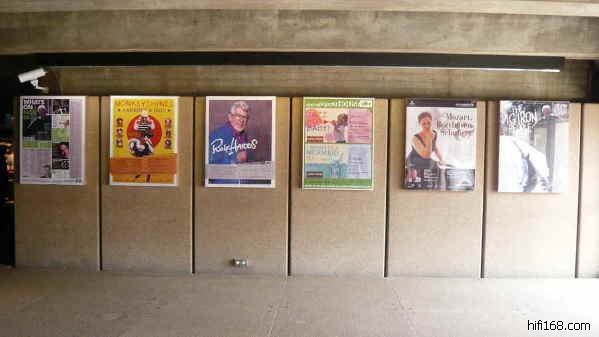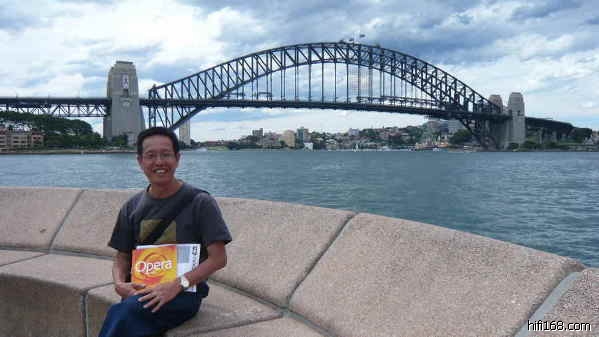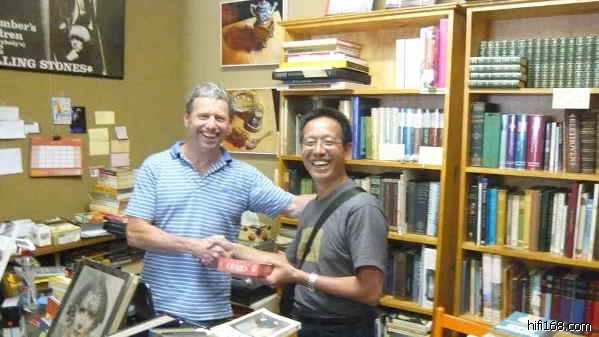|
fit3689
- 论坛发烧友
- 22
- 29
- 2008-04-08
|
 fit3689论坛发烧友
fit3689论坛发烧友
1#
t
T
 发表于 2008-12-24 06:40
|只看楼主
发表于 2008-12-24 06:40
|只看楼主
上次发的照片太大了。这次发些小的,并补书评( http://www.independent.co.uk/arts-entertainment/books/reviews/music-at-the-limits-by-edward-w-said-963956.html) Music at the Limits, By Edward W SaidEdward Said clearly had a passion for music, so why was he such an ungenerous critic?Reviewed by A C Grayling
Sunday, 19 October 2008 Collections of performance reviews, whether of music or theatre, suffer a fatal weakness: their moment belongs to the period very shortly after the performance itself, and thereafter they quickly date. Only the historians of performance, or the biographers of performers, find old reviews interesting – apart from the performers themselves, who usually remember their bad reviews best, for such rankle forever.But some reviewers use the particular occasion to make general observations which, if they express keen sensitivity and deep knowledge, are worth preserving in collected form. This is no doubt the motive behind this collection of Edward Said's writings on music. Said served as music critic for The Nation for many years, and his passion for music was well known.This book contains more than performance reviews, for there are also reviews of books on music and composers, and of books by musicians; and there are more general essays touching on subjects of special interest to Said such as Glenn Gould and Wagner, not least the subject of Wagner's taboo status in Israel, which his friend Daniel Barenboim has courageously challenged. These are not Said's first writings on music to be published in book form; there are three other volumes, one of them a record of conversations between Said and Barenboim, with whom he founded the West-Eastern Divan Orchestra scheme that brings together young Israeli and Arab musicians each summer. That book was illuminating for various reasons, not all of them intentional. It was not that they illuminated the superiority of the knowledgeable professional to the trespassing amateur, for in fact trespassing amateurs definitely have a place in all matters cultural. Rather, they showed the superiority of that particular professional to that particular amateur when it comes to music.The striking thing about the present collection of Said's musical writings is how ungenerous a critic he was. Scarcely anything he says about any performer or performance is without its carping; even praise is qualified and usually soured by some complaint. The Met in New York, which was naturally enough the subject of many of his Nation reviews, seemed to be a particular target. Here is an example of his characteristic reviewing attitude, bringing together almost too many shins to be kicked in the space of a paragraph or two. The subject is a production of Verdi's Otello with Placido Domingo and Carol Vaness. Said calls it "abominable" and goes on to rate the "senseless opulence of Michael Yeargan's sets ... the stage proceedings were on the whole dull and even stupid ... I'm not a Verdi fan, but even I know that this makes the old boy seem more vulgar and illogical than he really is." Domingo's singing, he goes on to say, seemed "harsh and strained", while Vaness was "distant and at moments cold". And this wasn't a disastrous production, but merely an evening that Said did not enjoy. Almost every review, even those with more positive things said in them, is like this; what he gives with one hand he takes back with both. Charles Rosen's fascinating book The Romantic Generation, which Said does not seem fully to understand, is described in his oddly tortured way thus: it is "a remarkable amalgam of precise, brilliantly illuminating analysis, audacious generalisation, and not always satisfying – but always interesting – synthesis, scattered over more than 700 pages of serviceable but occasionally patronising prose"."Patronising" is a pretty accurate description of Said's own writings about music, but it is pretty rich as a judgement by Said on Rosen. It is a real curiosity that with Said's breadth of interests and cultural habitations – he was chameleon-like, an Arab and dispossessed Palestinian when he wished to be, a domiciliary expert on Western culture when he wanted to be, a New Yorker, a native of Jerusalem, an Easterner, a Westerner, at will – his writings on music have very little of the historical and philosophical reference of Rosen's writings, and of course scarcely any of the musicological reference. As the conversations with Barenboim also show, Said does best when not standing right next to the real thing.This is not to say that his writing about music lacks interest: to apply to him the same kind of mixed judgement that is his own stock in trade, one must acknowledge that his passion for music does him credit, as does his insistence on high performance standards, even if he imports to his music writing too much of the lordliness with which literary criticism palliates its own essentially parasitic condition, and too much of the self-assurance about being right that identification with an oppressed people confers. Each of these stances is justified in its own domain, but neither works well in talking of music, where the very minimum required of everyone involved before a performance even begins is accomplishment of the highest level, and commitment of the profoundest kind. That does not mean one should be blind about standards – not at all – but it does mean that one should start from a generous point of view, and be attentive to intention as well as execution.
-
-
P1030056(1)(1)(1).JPG
(, 下载次数:46)
悉尼歌剧院招贴画(2008/12/24 6:40:21 上传)

-
-
P1030058(1)(1)(1).JPG
(, 下载次数:44)
购票处(2008/12/24 6:40:21 上传)

-
-
P1030091(1)(1)(1).JPG
(, 下载次数:47)
歌剧院外(2008/12/24 6:40:21 上传)

-
-
P1030479(1)(1)(1).JPG
(, 下载次数:48)
与店老板(2008/12/24 6:40:21 上传)

-
-
P1030481(1)(1)(1).JPG
(, 下载次数:46)
书店(2008/12/24 6:40:21 上传)

|